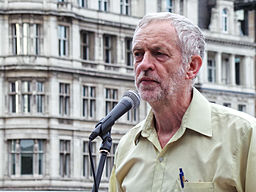Although it has been some six months since we left the USA, I did promise a final post before shutting this blog down. Given what has happened in the last six months – in the USA and the UK among others – it would be difficult to part without any comment.
In a brief visit to the USA a couple of weeks ago, to Anaheim for the NAMM Show and to the City of Angels, the mood was sombre: watching the Trump inauguration live on US soil was vomit-provoking enough (and it was interesting how many people I talked to shared a secret wish that the CIA would take him and Pence out during the ceremony but before the swearing in) and staying with the live TV feeds showing the visibly deserted streets around the parade route to the White House has helped me maintain my sanity despite everything the White House machine has attempted to throw at me and the world since that I can’t trust my own eyes.
It is an old adage about hypnotism that a subject can never be hypnotized into doing something they really don’t want to do. They can however be persuaded to do things that their conscious selves would rarely consider or be ashamed to admit to. There has been something hypnotic about the way that Nigel Farage (rhymes with “cabbage” if his pure Englishness claims are to be taken seriously; none of that fancy “Farage, as in barrage” foreign nonsense, if you please) in the UK and Donald Drumpf in the USA managed to tap into people’s worst insecurities and convince them to align with their vile and hateful rhetoric.
It became clear to me early in 2016 that Trump was no outside field no-hoper: a clown, a demagogue, an idiot (in the original sense of the term) certainly but one who – uncomfortably for many – articulated a betrayal of the white working class by “leftie Hollywood liberals”. Trump doesn’t know “shit from Shinola” (thanks to my Carolinian friends for that one) when it comes to the real plight and suffering of the working class but that didn’t stop him exploiting their fears mercilessly and successfully. And the Democrats let him get away with it. Helped him get away with it even.
About a year ago, I had a couple of lunch meetings with some very prominent and brilliant Democrat pollsters and analysts who had “run the numbers” and concluded that there was no way that Trump could win: to paraphrase: “when you look beyond the safe Democrat states, it would be impossible for him to swing so many voters – not enough people are going to vote for him in the swing states. He just can’t do it”. I countered “the safe Democrat states? why wouldn’t they vote for him?” “He’s a nut job, working people aren’t going to vote for a billionaire reality TV star!”. The Democrats strategy was flawed from the get go. It was exacerbated by the decision in October to drop all electoral activity in the supposedly safe states and concentrate on the swing states. Democrat campaigners closed up offices and moved out of their heartland states assuming they were safe.
My growing sense of discomfort strengthened during Spring 2016 with the increasingly nasty EU referendum campaign in the UK, culminating with the horrific murder of Labour MP, Jo Cox, in her own constituency by someone yelling “Britain First” and clearly taking Farage’s hatred as a personal call to action. Many assumed that the outrage would shock the public to its senses rather than seeing it as an isolated individual who could be hypnotized to murder while millions of others were ‘merely’ hypnotized to hate.
Back in the USA, we ended our nearly seven year stint in Los Angeles with a month long trip across the USA by train, taking in 19 states over the course of July and spending plenty of time on those trains talking with fellow passengers. Time after time I heard laments from working people about the state of the nation, the cost of healthcare, how the corporations were buying politicians, how Washington didn’t care – and how Trump would be their guy. No amount of reasoned discussion, presentation of facts, or dialogue would change their convictions, cultivated and strengthened over months if not years by hypnotic rants and fake news. Trump – like Farage – had framed the debate and so everything in the debate was about them. They had already won.
Back to today: will people – in Britain, where Parliament is currently debating whether to pull the trigger on launching the most disastrous and consequential process of disengagement ever; or in the USA, where the first week scorched Earth approach of Bannon is beyond his wildest wet dreams – start to see that they have been hoodwinked?
No. And there are four important reasons why.
“Alternative Facts” aka Lies
It is not that people have honest disagreements about what is and what isn’t true. We are way past such a polite and decorous political landscape. We see now an entire machine dedicated to propagating lies and making them stick. Not only is the sheer volume of made-up nonsense worrying in itself. It is also the methods deployed to make these lies over time become believable and believed. Orwell’s 1984 articulates the process very clearly with “Newspeak” but there is a twist with social media.
If you are unfortunate enough – as I was recently – to challenge one of these propagators of lies online, be ready to be subjected to a barrage of hateful comments as well as private messages either threatening you or appealing to your good moral values. “That’s my Facebook wall post” you are commenting on (it actually wasn’t). Have some respect (I did). Who do think you are muscling in like that? (I commented. If you don’t want people to comment, disable the feature). I’m just a young female student feeling intimidated by your angry comments (“She” isn’t any of those things).
Net result: if you try to address a lie, you will be vilified and in the end you give up. I revisited such a dialogue a few weeks after it had happened (and where, indeed, I had given up after several fairly nasty attacks, public and private) to see the offending poster triumphantly announce to the discussion “You see? He doesn’t have the courage of his convictions. I told you he was a liar”. And so it goes. For evil to triumph it is sufficient that good people do nothing.
Silos
Writing recently in the UK’s The Guardian newspaper, columnist Simon Jenkins argues that “post truth politics will be debunked by online facts” and to an extent he is right – although the sheer volume of misinformation and disinformation makes it difficult to always be able to find the accurate and truthful refutation of the nonsense out there. But his analysis fails to take account of one further factor in the age of online news and information distribution.
People are subjected to an ever increasing range and quality of information sources and what they are exposed to is nearly always intermediated by social media services that run algorithms that in turn select content that accords or at least is similar to their views and those of their friends. We prefer to consort and exchange comments online with people with whom we already have an affinity rather than engage in the real world with a person next to us on a bus, tram or train.
The bigger danger is thus a silo mentality in which there is no longer any meaningful, constructive or open discourse in the public domain. Instead we see the “echo chamber” of peer reinforcement and when – and if – we venture beyond our comfort zones, it is to trade increasingly virulent volleys of statements between our silos across a deserted wasteland that used to be the place of informed debate.
“Gaslighting”
More than just a tissue of well-laid lies, gaslighting (from the eponymous play and subsequent films) is a deliberate process of undermining people’s belief in what they know to be facts and true. By continually presenting them with “alternative facts” and backing those lies up with ever more “evidence” to contradict their world view, people over time start to doubt themselves and admit that the other party might “have a point”.
I witnessed this in our summer train trip last year on several occasions in the form “well you say that and it’s what I thought too but I’ve heard so much recently that contradicts it, that today I’m not so sure”.
You may not be able to fool all of the people all of the time, but it seems you can fool enough that they begin to doubt the truth when presented with it – and that is enough for dangerous political manipulators to take advantage.
“Headfakes”
OK, this term is a new one on me but not the concept: deliberately staking out a position so outrageous that when you concede a little to the rage that follows, you leave the other party with a sense of marginal victory and yet still end up with a position consolidated way more extreme than the initial state. Some have argued (for example here, from whence I also learnt the term) that President Trump’s controversial immigration ban is one such example. “Even green card holders originally from those Muslim countries are banned!”. Massive protest ensues. The White House clarifies that green card holders are exempt. Some people go away thinking that the protesters and civil liberties lobby have won something. They have not. The policy is real. It is an international disgrace. It is probably illegal. It defies UN conventions. It is certainly immoral and definitely unjust.
Taken together we have a potent and toxic cocktail of despotism in the hands of some very unscrupulous characters at the rotten heart of the new administration.
From the comfort of my new home in Belgium it is easy to philosophize about what we should do next, whether in the USA or in Britain and blithely arguing that “there should be a law against this sort of thing” isn’t going to help. What is needed is a much deeper soul searching – particularly on the left where such marketing and propaganda techniques are treated with distaste – and insights into how to respond politically and socially.


